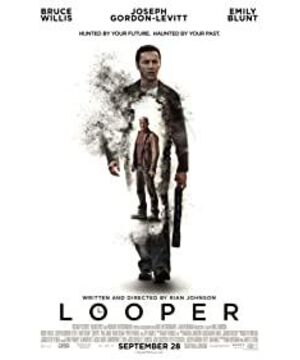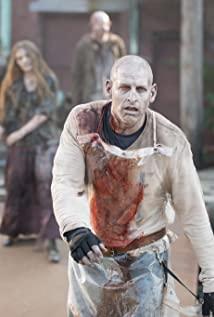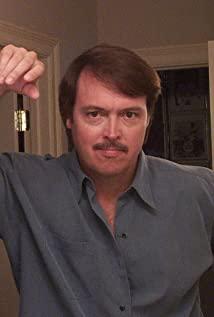This movie JGL is undoubtedly the male number one, SF background-these two items themselves must be attractive to me. But the expectations at the beginning were not very high. The first thing that knocked me down was the unexpected literary style at the beginning, the killer Joe, who was sitting on the edge of the wheat field, smoking and learning French. This is an anti-climax narrative method, unlike most SF setting movies, which initially portray the worldview with great fanfare or hide the worldview directly. This movie makes this setting daily, using simple, monotonous, and repetitive steps to pull a cruel and dark supernormal setting into the background. The characters are very prominent.
Here I want to talk about the issue of the deletion of the domestic version. I am not trying to defend the behavior of arbitrary deletion, I just talk about what I saw and my thoughts. The movie begins with an introduction to Joe and his livelihood. After watching him take care of his daily work, he went to a night club and rushed to say hello to a show girl. At the beginning, there was a little bit "I want to take you to the end of the world" anyway. Or "This woman is the source of the trouble to Xiaoqiang" and so on, but after that there was nothing about this character, and I forgot her, even when the old Joe ran out to kill her daughter in the second half, I didn't recognize it. Come out of her. This is a broken plot caused by an abridgement, but it does not affect it. Instead, it further creates a sense of daily life: you meet people in your life, you have this kind of thoughts about this person, and that kind of thoughts about that person, you Even whoever he likes, thinks about him, but it ends here, and it quickly becomes an episode. It's difficult to create such an impression in a compact story, but this cut-off happens to fit Joe's song every night. He watched other people seal the ring to celebrate, and thought about his future, but in his inner monologue, he only said "If you have hope for the future, it is better not to choose this career". In the abridged play, he did not say "I" through his mouth. It's a last resort" or "I want to live a good life in France" are all displayed by the sidelines and even through people coming back in the future. I am very impressed by this kind of calm treatment.
My favorite is the core ending. Joe made a stop-motion monologue before killing himself. This is really a way of expression that only movies can show. He said: So I saw everything. I saw a mother was killed to protect her child, a man killed for his wife, and a child grew up with hatred and fear. He saw the causal cycle in this world, and saw through his own insignificant and ridiculous position in the cycle.
Later, I saw the director’s interview on Weibo, which included his overall evaluation of Joe. He said that Joe is just to "keep" his life, he does not need redemption, he just wants to live a luxurious life. Go down. This trait has never changed from young to old. The old Joe and the young Joe met in the restaurant, and the young Joe said, "You, I will look at her picture. I can take a detour in the future, so that I won't save her." According to the timeline in the photo, it is said that it is correct. (I'll talk about the timeline later) But old Joe insisted not to give it. The director's commentary is: "He just want to hold on to her", he must meet her, not sacrifice his desire to save her. This is the tone of the character Joe.
So in the end, when Joe made the decision to commit suicide and save the world, how strong the contrast was. There is even a philosophical "sublimation" effect. I think the success of the film lies in its conveying this concept. Joe's behavior has gone beyond nobility. In the abridged version, there is no background that he himself was abandoned and went astray since he was a child, so when I read it, I only got one kind of message to convey, that is, he "sees through" the world. He detached himself from the perspective of a "person" and "a person". He saw the whole picture from a higher level of understanding, so he naturally made that choice. For him, it may not be a sacrifice at all.
This "foreseeing" scene reminds me of a plot in the "Hazard Dictionary". A long time ago, I remember a general idea, it was said that there was a mysterious figure in Hazar-related history, probably a princess, so there is no record of her death in the ancient books, only one mentions a legend. Said she has magical powers, she can see the past, present and future at the same time. Every night, in order to avoid being assassinated, she asked the blind curse to draw deadly letters on her closed eyelids. Those who wanted to get close to kill her would die on the spot as soon as they saw those letters. But one day, someone put a mirror in front of her. When the morning came, she opened her eyes when she woke up. She saw in the mirror at the same time she was asleep before and the letters on her eyelids, and she saw herself who died immediately afterwards, and then she died.
I think Looper's ending has almost reached such a fascinating situation with multiple meanings.
Looper's timeline is explained in this film. Through the questioning of Joe young to old Joe, he came to a very simple understanding that the past creates the future. It should still follow "What happened, happened". What happened in the past "past" has an irreversible impact on the future, unless you return to the previous past to change it. I have watched a program on the Discovery Channel before, and talked about a more likely time machine. Through this machine, time can be shuttled, but it can only go back to the era when it was created at the earliest, not the era when the time machine did not exist. I guess Looper's time machine probably also has this attribute.
The possible paradox of Looper's timeline is that through time travel, future people created will be able to participate in the process of creation itself. However, leaving aside the time single arrow attribute, I readily accept this setting. Isn't this a kind of "feedback" mechanism, which in turn affects the production process by manufacturing products. Generally speaking, negative feedback is benign, because it is mainly an inhibitory effect and can control production; while positive feedback is malignant, it is likely to cause an infinite amplification effect, and the final result is out of control. According to this number of ways to understand, if young Joe did not commit suicide this time, and the old Joe killed Sarah and created Rainmaker, then it should probably be a positive feedback.
But when I think about it, I happen to feel that even if the ending is like this, even if the director himself said that this is just a Sci-fic movie about parenting, the question raised is dark, but at the end it is the beginning of light-I can still It understands "darker" up. This is why I like Looper very much. Imagine Rainmaker's perspective, is he a fool? Takeshi who abuses his power, has no plan, only the resentment of revenge on the world? How could it be? The Cid seen in the play is a child who can hardly control his emotions, but he is obviously very high in IQ. His special place is not only in his super TK ability, but also in his intelligence. The intelligence of young children is largely reflected in the "memory", so it can be inferred that he would never just "remember" the key person Joe in this life and death experience 30 years ago.
Once you accept this setting, then everything can be reversed and re-understood. First of all, the leader of the organization is sent by Rainmaker from the future to rule the loopers. Why send a future person back to the past to manage it? "Knowing the future" must be an indispensable condition for a certain task he shoulders. I think it is to guide or induce Joe. Two details suggest that Joe himself is the focus of the whole thing. One is the very conspicuous "You must go to China" (because China has invested heavily in the movie XD). Everyone has seen this. The other one is very hidden-this future man, he knows Joe's secret, he knows that Joe has hidden the silver nugget privately. Of course it can be said that he found it through auditing, but think about the last shot of the film, young Joe died not far from the broken car that old Joe drove for him. The broken car overturned and fell on the ground. Silver nuggets, Sarah who survived saw them, and the movie gave a shot specially, so it was inevitable that she used the money to raise Cid.
From this, a terrible possibility can be derived, that is, Joe killed himself and created Rainmaker. Here again involves the question of timeline. But this is also achievable. Rather, from the standpoint of a single Rainmaker, he must complete all the events of childhood according to his memory, so he followed these steps to guide and create this series of events. In this way, the bloody operation of the Great Ring Seal, including the bloodbath of Looper's headquarters 30 years ago by Lao Bu, is understandable. Because they are all deliberately arranged by Rainmaker.
Finally, I want to discuss the interaction between the two roles of Joe and Joe. Applying Lost's classification logic, the two roles are man of science and man of fate. I think the old Joe belongs to the man of fate. At the end of his life, he has a sense of mission. He believes that he is responsible for the key factors that change his fate (the birth time and coordinates of Rainmaker obtained by accident), although in the end he may or himself , Became the creator of this destiny. This is against his wishes. Young Joe is relatively a man of science. He is unwilling to change his behavior for the sake of fate. He believes that 1. He can avoid knowing Aunt Xu Qing; 2. He accepts Sarah’s theory and believes that Cid can be changed and avoided through mother’s education. He became a Rainmaker; 3. He has an "unknown" vision for the future, regardless of whether he is subjectively a person who "gave up any ambitions".
But in the end, a young Joe who made an effort to destroy himself in order to eliminate the disaster in the future, his more objective position changed. He surpassed his own destiny in a way of participating in his own destiny (of course, according to my rogue understanding, he is still fulfilling Rainmaker's mission). So why do I think Looper is a drama? Because I think it is not about a worldview or an event. It is about a proposition that is very brief but difficult to describe clearly, that is, a person's exploration of one's own internal causes. After all, it's really a seal.
View more about Looper reviews











